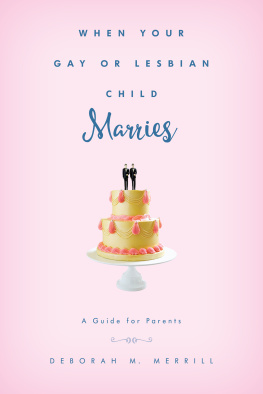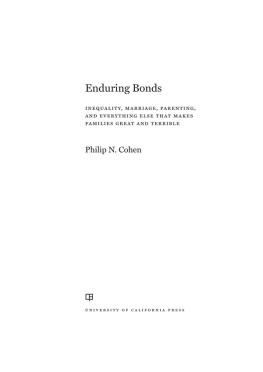
OVER HALF OF ALL BIRTHS to young adults in the United States today occur outside of marriage, and most are unplanned. This trend is driving a growing class divide. At the top are planners, who are marrying and having children only after establishing a career. At the bottomand increasingly in the middleare drifters, who are having unplanned children early, outside of marriage, and without the stable support of a second parent. This divide is contributing to rising inequality and decreased social mobility for both young parents and their children.
The political right calls for a return to traditional marriage; the left proposes more social programs to help less advantaged families. In Generation Unbound, Isabel V. Sawhill offers a provocative third approach: turning drifters into planners and thereby ensuring that more children are born into families with the means and motivation to care for themand saving billions of dollars in social costs.
How do we make this shift? Drawing on behavioral economics, Sawhill offers recommendations for preventing unplanned pregnancy among young adultsfor example, by offering greater access to long-acting reversible contraception (such as IUDs) to help stem the tide of children born to parents who are unprepared for the financial and social responsibilities of raising a child.
ISABEL V. SAWHILL is a senior fellow in Economic Studies at the Brookings Institution. She also serves as co-director of the Center on Children and Families and is president of the board of the National Campaign to Prevent Teen and Unplanned Pregnancy.
Cover images: Shutterstock.com
Jacket by Beth Schlenoff Design
GENERATION UNBOUND
Drifting into Sex and Parenthood without Marriage
Isabel V. Sawhill
BROOKINGS INSTITUTION PRESS
Washington, D.C.
Copyright 2014
THE BROOKINGS INSTITUTION
1775 Massachusetts Avenue, N.W., Washington, D.C. 20036
www.brookings.edu
All rights reserved. No part of this publication may be reproduced or transmitted in any form or by any means without permission in writing from the Brookings Institution Press.
The Brookings Institution is a private nonprofit organization devoted to research, education, and publication on important issues of domestic and foreign policy. Its principal purpose is to bring the highest quality independent research and analysis to bear on current and emerging policy problems. Interpretations or conclusions in Brookings publications should be understood to be solely those of the authors.
Library of Congress Cataloging-in-Publication data
Sawhill, Isabel V.
Generation unbound : drifting into sex and parenthood without marriage / Isabel V. Sawhill.
pages cm
Includes bibliographical references and index.
ISBN 978-0-8157-2558-9 (hardcover : alk. paper)ISBN 978-0-8157-2635-7 (pbk. : alk. paper) 1. Unmarried mothersUnited States. 2. Unmarried fathersUnited States. 3. YouthSexual behaviorUnited States. 4. Family planningUnited States. 5. MarriageUnited States. I. Title.
HQ999.U6.S35 2014
306.874'32dc23 2014016992
9 8 7 6 5 4 3 2 1
Printed on acid-free paper
Typeset in Sabon and Ocean Sans
Composition by Cynthia Stock
Silver Spring, Maryland
To
JOHN, JAMIE, AND JOHN
Three Generations Bound
Preface
Writing a book is hard. So one better have some good reasons for doing so.
One reason I wrote this book is because I began my career studying family issues and wanted to revisit them with the benefit of more years of experience. Although trained as an economist rather than as a scholar of the family, my first serious research job was working on a Ford Foundationsponsored project devoted to assessing whether the increasing number of female-headed families in the black community was as problematic as Daniel Patrick Moynihan had contended in his famous report The Negro Family. This project led to my first book, Time of Transition: the Growth of Female-Headed Families, co-authored with Heather Ross and published by the Urban Institute in 1975.
Nearly forty years later, I am still drawn to the issue of how changes in the family have affected child poverty, inequality, and social mobility in the United States. The issue is no longer just high rates of unwed parenting in the black community. It is high rates for whites as well. I have come to believe that social policy faces an uphill battle as long as families continue to fragment and children are deprived of the resources of two parents.
The issue has recurred in my work, both as a researcher and as a government official. As an associate director of the Office of Management and Budget (OMB) during the Clinton administration, I worked on the president's welfare reform legislation. The question of what to do about the breakdown of the American family was an important part of the legislative debate at that time. The reform law, enacted in 1996 on a bipartisan basis, contained two new messages. To women, it said full-time motherhood at public expense is no longer an option. To men, it said if you father a child you will be expected to contribute to that child's support.
I encouraged the president and other members of his administration to focus more on the prevention of teen pregnancy, something both he and the first lady actively supported. After leaving the administration, I helped to launch a new bipartisan nonprofit organization called the National Campaign to Prevent Teen Pregnancy. This organization, whose board I now lead, later expanded its mission to include not just teen pregnancies but also unplanned pregnancies among single women in their twenties. I am proud to say that we have had considerable success, especially in reducing teen pregnancy. The teen birth rate has declined by over 50 percent since 1991. However, parenting by young unwed women has not declined. It has just moved up the age scale.
Although welfare reform was enacted in 1996, and teen pregnancies and births have declined, the debate about what to do about the growth of unmarried parenthood continues to rage. So I was not particularly surprised when, in 2012, the Washington Post asked me to write a piece reflecting on the twentieth anniversary of former vice president Dan Quayle's criticism of single motherhood, in which he used the behavior of a TV sitcom character named Murphy Brown to make his case.
Murphy Brown was an unmarried 40-something journalist who found herself unintentionally pregnant and decided to raise the baby on her own. Quayle criticized the show for sending the wrong message to younger viewers about the importance of marriage. It set off a national debate in the media about family values. In my article, I wrote that Dan Quayle was right. While he may have picked the wrong role modelsince most unmarried moms are younger, are less educated, and make less money than the fictional news reporterhis concern about changes in the family were consistent with research showing that children, on average, benefit from being raised by their own married parents.
Although I was not surprised by the Post's interest in these family issues, I was surprised by the intensity of the response to my article. It became the most viewed article of the year in Outlookthe newspaper's Sunday opinion section. In a matter of days, more than 2,500 comments were logged on the Post's website, and I received dozens of letters and calls from readers who wanted to share their (often heated) opinions on the matter.







